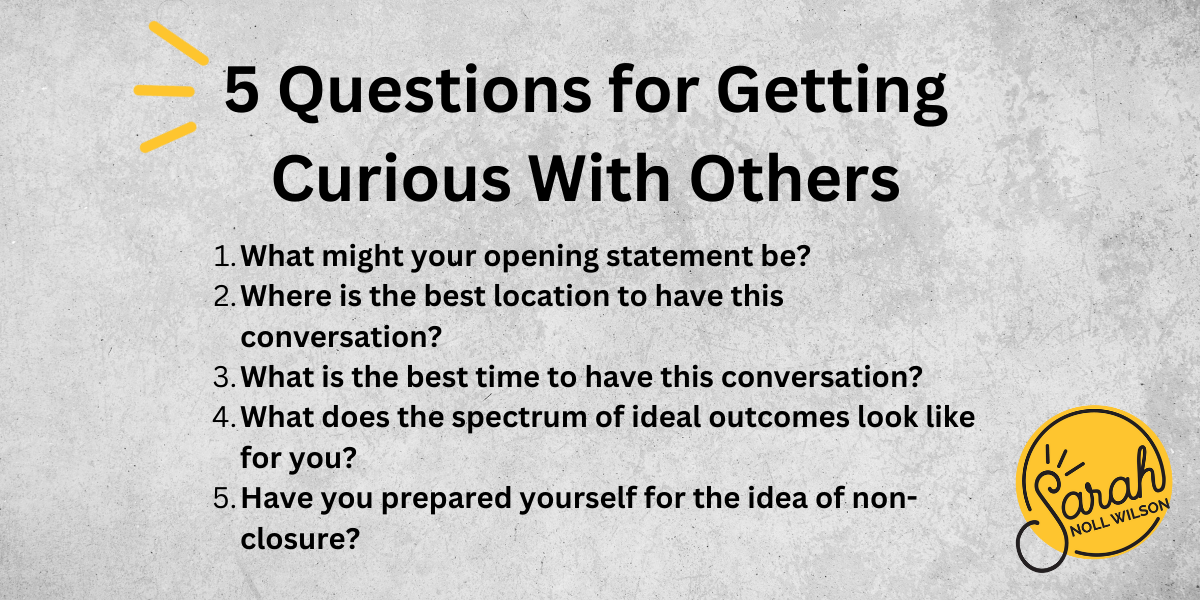
by Dr. Teresa Peterson
Part of working with and living among fellow humans is handling situations when the heat gets a little turned up. Avoiding situations or conversations that might feel a little uncomfortable can feel like it’s working for a while, but eventually—and especially if we want healthy and constructive relationships—we get to enter a deeper level of connection by being authentic and honest, with ourselves and other people.
That might mean choosing to step into a conversation we think might be uncomfortable. (I know, I know . . . but if I can do it, so can you.)
A couple things we know to be true, backed by research from The Gottman Institute: The first three minutes of a conversation are a big predictor of how the rest of it is going to go, and there’s a connection between the quality of our conversations and the quality of our relationships. What both of these facts together tell me is that a little bit of preparation and planning can go a loooooong way. And (no surprise, probably!) we can use curiosity to do that.
In our previous exploration of The Curiosity-First Approach™, we discussed how to get curious with yourself by using 5 Questions to Ask if You Feel Stuck. Next, we discussed how to get curious about others by using 5 Questions to Get Out of Your Own Head. Today, we’ll explore how to get curious with others by preparing for conversations that matter. Let’s look at five questions to get you started:
1. What will your opening statement be?
Too often, folks think that a conversation that’s been weighing on them is just going to happen spur of the moment. Has this ever happened to you? You’ve been avoiding it or trying not to think about it—and then, presto!—you want to be able to absolutely nail this conversation you’ve been actively trying not to prepare for.
I hate to break it to you, but that doesn’t usually work out well. As part of your preparation, know that the first three minutes of a conversation matter a lot. What will you say first? What sentence(s) will you open with that will set the stage for a healthy outcome?
2. Where is the best location to have this conversation?
Where you have the conversation matters. If you’re looking for a conflict resolution or a healthy basis for collaboration, for example, you probably don’t want to be staring at the other person from across your desk. (Hello, power dynamics!)
Shoulder to shoulder might be a little better . . . or you could even get out of the office completely. In the world of hybrid and virtual workspaces, don’t underestimate the power of a strategic phone call or Zoom meeting to decrease some of that pressure, depending on your relationship and the outcome you’re hoping to achieve.
3. What is the best time to have this conversation?
When you have the conversation matters, too. If you know the person you need to speak with isn’t a morning person, perhaps ambushing them at the coffee pot with a “We need to talk” isn’t the best option.
The same goes for when you feel at your best, too. I’m not advocating for ignoring all your preferences . . . not by a long shot. If you’re facing a big deadline, for instance, maybe you put off the (non-emergency) chat until the following week when the stress is dialed down a bit.
Don’t underestimate the power of asking some version of: “I want to sit down and talk about X. Is there a good day and time that works for you later this week?”
4. What does the spectrum of ideal outcomes look like for you?
You probably have a desired outcome from your conversation: agreeing on a plan of action, setting a boundary, feeling some sort of healing or reconciliation, innovating a solution to the problem at hand, and so on.
Picture that desired outcome on a spectrum: If you were to move it a little further into the “compromise” end, on your part, what would that need to look like? What if you moved it a little more on the “my kind of resolution” side? What would you be willing to give in order to get that?
There is more than one way to solve a problem and find a healthy outcome. Part of that is preparing ourselves for the simple fact that we might not get exactly what we want and that success can look different to different people. Practicing being a little less rigid in your definition of success as part of preparation isn’t a sign of weakness—after all, you set those ends of the spectrum wherever you’re comfortable—but instead is a sign of your commitment to moving forward.
5. Have you prepared yourself for the idea of non-closure?
It’s possible both you and the person with whom you need to have a conversation have been stewing about the same thing. You’ve been rolling it around in your brain and as part of the avoidance trap, so surely they have too . . . right?
Sometimes, yes. And sometimes, no. Remember that because you’ve been chewing on something for a while does not guarantee anyone else has. This big, important conversation you’re reading this article to prepare for? It is possible that the other person will be hearing about it for the first time.
Not every situation where the heat is turned up gets tied up with a nice bow or ends in some Hollywood-esque moment. Prepare yourself for this reality by expecting non-closure. Expect that it might take more than once to arrive at a resolution, and remain curious and patient. Expect, even, that it may never end in a resolution that falls somewhere on your spectrum; sometimes, feeling heard and saying the hard thing is what we needed all along.
What’s Next?
The next time you know you need to get curious with someone and have a conversation that matters, don’t overlook the value of preparation. You might even keep this little graphic around on your desk, in your notebook, or in your car as a reminder.

Let me know if these work for you and what you would add to the list!

Dr. Teresa Peterson
Dr. Teresa Peterson is the Director of Learning and Development for Sarah Noll Wilson, Inc. In her daily work, she serves as Sarah’s key content collaborator. Teresa enjoys facilitating, researching, and is passionate about applying best practices for learning to make our experiences meaningful, engaging, and accessible for all types of learners. Teresa holds a Doctorate in Education from the University of Northern Iowa and brings over twenty years of experience teaching, facilitating, and leading to our team. Our clients love Teresa’s grounded energy, depth of thought, and ability to listen deeply.

